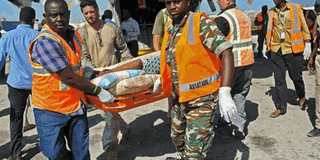Experts say the Amisom-Shabaab fight could be bloody, drawn-out

United Nations and AMISOM staff medics help wounded civilians at Mogadishu airport on February 29, 2016, after at least 30 people have been killed in twin bomb attacks claimed by Al-Shabaab in Baidoa. Amisom is struggling to adapt to a rural counter-insurgency after its eventual success in urban combat pushed Al-Shabaab out of Mogadishu five years ago. PHOTO | MOHAMED ABDIWAHAB |
What you need to know:
- On January 15, the fighters overran a military outpost in El-Adde, southern Somalia, manned by up to 200 Kenyan soldiers deployed as part of the African Union peace-enforcement mission, Amisom.
- Kenya has refused to say how many soldiers were killed.
- Matt Bryden, director of Sahan Research, a Nairobi-based think tank, described the first such attack, on a Burundian forward operating base in Lego last June, as a threshold operation.
- Its success meant that assaults on isolated company-sized Amisom units became their standard operating procedure.
- Amisom’s effectiveness is hampered by suspicion and jealousy among main troop contributing countries and a lack of coordination, funds, focus and will.
MOGADISHU, Friday
On a Sunday afternoon in late February, a car bomb exploded outside a crowded restaurant in Baidoa and moments later a suicide bomber blew himself up among fleeing survivors.
At least 30 people died in the attack, the latest by Al-Shabaab, a Somali-based Al-Qaeda group that continues to defy predictions of its demise.
Two days before the Baidoa bombings, 14 people were killed when two bombs exploded outside a hotel in Mogadishu.
One was a 200kg homemade bomb, only the second time Al-Shabaab has used such a large device.
The first was in July and the explosion tore the side off a six-storey hotel.
Five weeks earlier, 19 were killed in a bomb and gun attack on a restaurant on Mogadishu’s Lido Beach.
It is not just civilians who are targeted.
AMISOM ATTACKS
On January 15, the fighters overran a military outpost in El-Adde, southern Somalia, manned by up to 200 Kenyan soldiers deployed as part of the African Union peace-enforcement mission, Amisom.
Kenya has refused to say how many soldiers were killed.
Matt Bryden, director of Sahan Research, a Nairobi-based think tank, described the first such attack, on a Burundian forward operating base in Lego last June, as a threshold operation.
Its success meant that assaults on isolated company-sized Amisom units became their standard operating procedure.
Amisom’s effectiveness is hampered by suspicion and jealousy among main troop contributing countries and a lack of coordination, funds, focus and will.
It is also struggling to adapt to a rural counter-insurgency after its eventual success in urban combat pushed Al-Shabaab out of Mogadishu five years ago.
“Amisom is fighting the wrong war,” said Stig Jarle Hansen, a Norwegian academic and author of a forthcoming book on jihad in Africa.
“Troops watch their own backs, they are in their garrisons, they go out patrolling once a week and the rest of the week Al-Shabaab is on top of things,” he said, adding that by enforcing local support, Al-Shabaab can survive for 30 years.
The losses inflicted on Burundians in Lego, Ugandans in Janale and Kenyans in El-Adde have cowed Amisom, which has retreated from some areas.
“Since Amisom is not in an offensive posture, Al-Shabaab has plenty of space to think, plan and prepare,” said Bryden.
AL-SHABAAB EXPANSION
One of the first moves by Al-Shabaab leader Ahmed Diriye when he took over in 2014 was to reaffirm the group’s commitment to Al-Qaeda.
And, with a recent revolt by internal Islamic State agitators crushed, suggestions that Al-Shabaab might be collaborating with West Africa’s Boko Haram are implausible.
Under Diriye, the organisation has gained vigour and expanded its regional reach, confounding predictions of its end.
“This is a movement whose membership and horizons are broader than Somalia, and is operationally active in at least six countries,” said Bryden.
Al-Shabaab no longer administers large territories, but has adapted to the new circumstances becoming, “simultaneously weaker and more dangerous,” according to Ken Menkhaus, a professor at Davidson College in the US.
An Al-Shabaab commander was on Thursday sentenced to death in Mogadishu for killing a journalist but far from being defeated, the group appears reborn.





